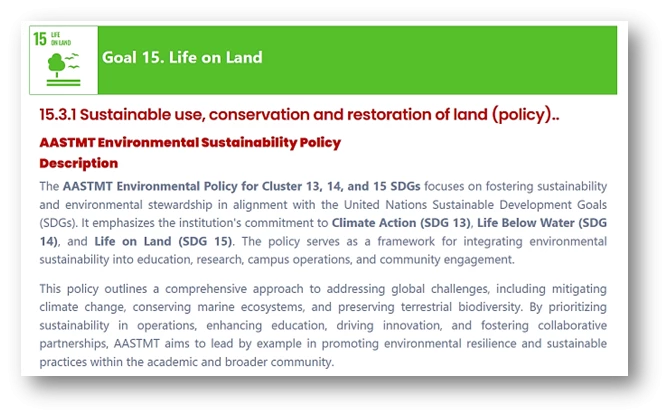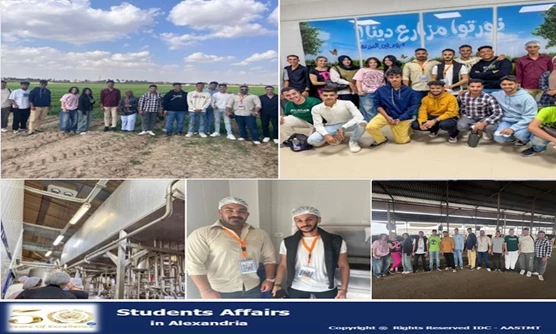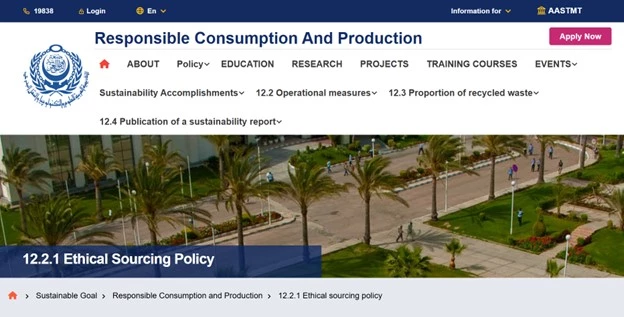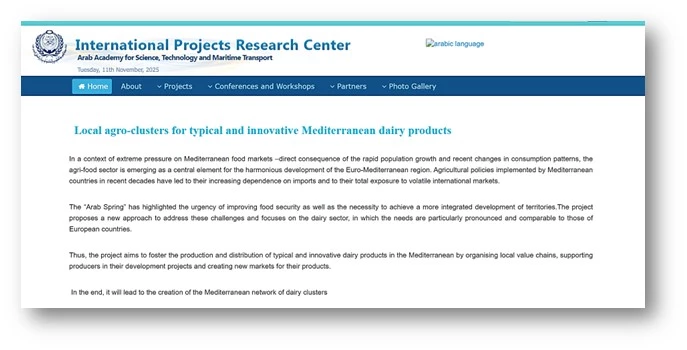

PROSPEROUS LIFE POLICY
No Poverty, Zero Hunger, Good Health and Well-Being
Introduction
Sustainable Development Goals (SDGs) are pivotal goals fulfilling world-changing objectives. Recognizing that the action in one area will unquestionably affect others, integration of the goals for the Prosperous Life overarching the No Poverty, Zero Hunger, and Good Health and well-being goals of the 2030 Agenda.
Scope
Applicable to all AASTMT members across campuses
Policy Statement
This policy aims to present the strategies and actions taken by AASTMT to contribute to eradicating poverty, hunger and maintaining good health and well-being. The policy is to provide the framework, and performance indicators for all members to review and abide by all attached measures where the desired main goal is to successfully make healthy behavior and community service a habit or a second nature to all AASTMT members. Also, AASTMT is enhancing its food sourcing and provisioning methods to promote sustainability, ensuring wholesome, locally sourced, seasonal, and sustainably produced food served across campuses in collaboration with the Student Union and academic departments. The initiated performance indicators are tailored to satisfy the present needs of the cluster goals and act as building blocks for future development. The policy has been developed per 2030 the Agenda for Sustainable Development.
Strategies:
National Hunger Actions:
Health Programs:
Infectious and Non-Communicable Disease Awareness and Prevention:
No Smoking Policy and Awareness:
Hazardous Substances Handling and Disposal:
Mental Health and Emotional Wellness:
Recognizing the importance of mental well-being, AASTMT has implemented a range of mental health initiatives to support both students and staff.
|
Policy title: |
Prosperous Life Policy |
|
Date created |
2022 |
|
Approving body: |
SDGs workforce committee |
|
Version: |
3 |
|
Last review date |
January 2025 |
|
Next review date: |
January 2027 |
|
Policy owner: |
|
|
Lead contact: |
|
|
Approval Signature
|
Dean of Scientific Research and Innovation |
AASTMT’s Environmental Sustainability Policy explicitly integrates sustainability principles in campus resource management, including food sourcing, waste reduction, and sustainable agricultural practices. AASTMT is committed to promoting environmental sustainability in all campus activities, including energy, water, waste, and food systems, ensuring practices that support sustainability goals and community wellbeing.

AASTMT Environmental Sustainability Policy
In November 2024, the Department of Cultural and Social Activities organized a scientific and educational trip for students of the Supply Chain Department (College of International Transport and Logistics) to Dina Farms, a local farm producing dairy, fruits, medicinal herbs, and livestock. During the visit, students received hands-on exposure to sustainable farming practices, including crop production, livestock management, and value-added processing. Providing students with practical understanding of sustainable agricultural systems, aligning with institutional efforts to promote responsible food sourcing. Supporting knowledge transfer that can inform future procurement or campus food programs.

Scientific Educational Trip for students to Dina Farms
In that meeting, they discussed “using AI in agriculture” and “developing new technologies to advance the agricultural sector.” This contribute to sustainable farming practices.

AASTMT – MAFI for Agricultural Produce Industries Meeting (Nov 28, 2024)
AASTMT is committed to embedding social and environmental responsibility into its core operations by prioritising ethical and sustainable sourcing of food and other supplies across all campuses. The policy outlines the university’s aim to engage trusted suppliers whose practices align with AASTMT’s sustainability objectives, to trace the origin of food via modern tools, ensure transparency in the supply chain, and support the reduction of food waste through monitoring, preservation practices and composting/vermicomposting systems. The policy emphasises healthy, safe, and sustainable food provision for students, staff and residents — along with operational measures such as food-waste tracking, donations, and use of organic compost across green spaces

The project LACTIMED (“Local Agro-Clusters for Typical and Innovative Mediterranean Dairy Products”) lists “College of International Transport & Logistics – AAST (CITL-AAST)” in Egypt as one of the partners. Another source mentions: “Egyptian partners include . Arab Academy for Science and Technology (AAST) …” in the launch of the dairy cluster in Beheira under LACTIMED. The project aims to strengthen local value chains, support small and medium dairy producers, and promote both traditional and innovative dairy products through sustainable production and distribution practices. Ultimately, it seeks to establish a Mediterranean Network of Dairy Clusters, enhancing regional cooperation, market resilience, and sustainable agricultural development across Euro-Mediterranean countries.

AASTMT- Local agro-clusters for typical and innovative Mediterranean dairy products
This declaration describes Campus seafood sourced in line with international sustainability rules, ensures 100% of seafood served meets sustainability standards. Shows that AASTMT has a formal commitment to sustainably sourced food served on campus as Seafood is part of the food offered on campus dining services.
 AASTMT Declaration on Sustainably Harvested Seafood
AASTMT Declaration on Sustainably Harvested Seafood
AASTMT implements biannual sustainable procurement tenders through its purchasing department, where suppliers are evaluated based on environmental conservation, cost-effectiveness, and quality. The university prioritizes local and sustainable suppliers, supporting regional biodiversity conservation, ecosystem management, and soil conservation by sourcing fresh, seasonal, and locally grown produce. AASTMT strengthens the ecological restoration of surrounding areas and contributes to habitat protection. Overall, this initiative emphasizing responsible food sourcing and ecosystem-friendly supply chain management.

AASTMT Commitment to Local and Sustainable Sourcing [Support for Local Farmers and Suppliers]
AASTMT states that it provides vegetarian and vegan options, locally grown produce, and aims to reduce food waste all of which contribute to biodiversity conservation, soil health, and reduced environmental impact. Also, the “Sustainable Food Purchases” section mentions that cafeterias offer meals using seasonal, fresh ingredients and plant-based options. These initiatives collectively ensure that food served on campus aligns with ecological conservation, resource efficiency, and sustainable land management principles. within the 2021–2025 period.

Sustainable food choices on AASTMT campus
AASTMT tracks campus food waste and converts organic waste into compost used for landscaping and gardening. This closed-loop system supports campus greening efforts. While this is part of sustainable food/organic waste management, it is indirect deals more with waste downstream than with how food is farmed. Such actions reflect AASTMT’s commitment to sustainability, afforestation, and reforestation concepts by enhancing the natural regeneration of green spaces, preventing the spread of invasive plants.
 AASTMT Campus food waste tracking
AASTMT Campus food waste tracking
AASTMT organizes events and field trips that bring together local farmers, food producers, and students to promote knowledge exchange and sustainable agricultural practices. where participants discuss organic production, irrigation techniques, and sustainable farming.

Events for Local Farmers and Food Production